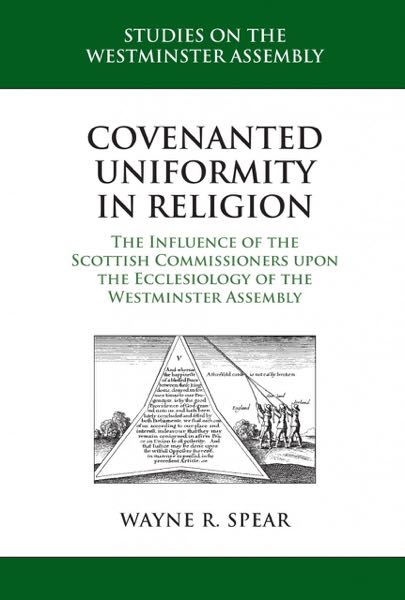
Wayne R. Spear
Reviewed by: L. Charles Jackson
Covenanted Uniformity in Religion: The Influence of the Scottish Commissioners upon the Ecclesiology of the Westminster Assembly, by Wayne R. Spear. Reformation Heritage Books, 2013. Hardback, 240 pages, list price $40.00. Reviewed by OP pastor L. Charles Jackson.
Dr. Spear is professor emeritus of systematic theology at Reformed Presbyterian Theological Seminary in Pittsburgh. The title of his book derives from a phrase in the Solemn League and Covenant regarding the work of the Scottish commissioners as they joined the ongoing labors of the Westminster Assembly in 1643. This study originated as Spear's doctoral dissertation at the University of Pittsburgh.
As the book jacket notes, Spear focuses primarily on the Form of Church Government. He begins by surveying the historical setting and explaining how the assembly conducted its business. Then, following the order of the Form of Church Government, he traces each significant expression from its origin in a committee, through its debate and modification in the Assembly, to its final placement in the document. Spear evaluates the significance of the Form of Government by considering the responses it received in England and Scotland. The Scots failed to achieve some of their most cherished goals in the Assembly debates, which demonstrates that the Assembly operated as a truly deliberative body. This book provides an accurate snapshot of the Westminster Assembly as it debated the proper structure and function of the Christian church.
It may seem unimportant to know about the debates that went on behind the scenes, but it's actually quite practical, especially for pastors who will be asked the very same questions that were debated at Westminster. If you have already thought through your answers with differing views in mind, then you will be better equipped to humbly help others work their way through the same questions. Many pastors, for instance, have been asked why only ministers can administer the sacraments. Or what's the difference between an elder and a deacon? Although this book has a definitely academic feel, it provides accessible answers to such ecclesiastical questions and thus can really help the church wrestle with questions about church government.
The history of the Westminster Assembly shows that there was a noteworthy amount of diversity among the views of the commissioners. For instance, the Assembly actually voted by one vote to ordain women to the office of deacon. The Assembly's editors dropped this from the final document, but it reveals a genuine diversity among those whom many of us consider the fathers of our Presbyterian heritage. Spear also conveys what may seem like a surprising diversity about the nature of classical assemblies or what we call a presbytery. This calls us to a sense of modesty as we continue to discuss and to think about some of the same issues today. Too often we are quick to dismiss those with whom we disagree, failing to remember that similar differences existed in the Westminster Assembly—an assembly that we sometimes consider the depository of Reformed theological wisdom.
I highly recommend this book to pastors and church libraries everywhere as a helpful reference for questions about church government.
March 30, 2025
On the Trail with a Missionary
March 23, 2025
Midnight Mercies: Walking with God Through Depression in Motherhood
March 16, 2025
March 09, 2025
Zwingli the Pastor: A Life in Conflict
March 02, 2025
February 23, 2025
African Heroes: Discovering Our Christian Heritage
February 16, 2025
© 2025 The Orthodox Presbyterian Church